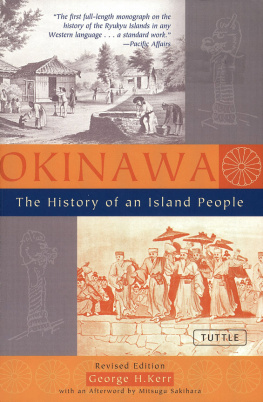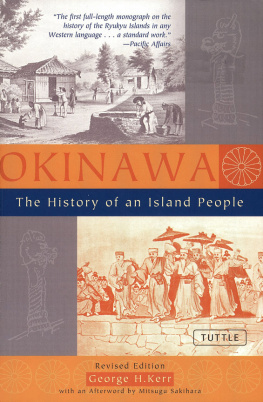OKINAWA AND THE U.S. MILITARY
OKINAWA
AND THE U.S. MILITARY
Identity Making in the Age of Globalization
MASAMICHI S. INOUE
Columbia University Press New York
Columbia University Press
Publishers Since 1893
New York, Chichester, West Sussex
cup.columbia.edu
Copyright 2007 Columbia University Press
All rights Reserved
E-ISBN 978-0-231-51114-8
Library of Congress Cataloging-in-Publication Data
Inoue, Masamichi S., 1962-
Okinawa and the U.S. military : Identity making in the Age of Globalization /
Masamichi S. Inoue.
p. cm.
Includes bibliographical references and index.
ISBN 10: 0231138903 (cloth : alk. paper)ISBN 0231511140 (electronic)
ISBN 13: 978-0231138901 (cloth : alk. paper)978-023151148 (electronic)
1. Military bases, AmericanJapanOkinawa-kenPublic opinion. 2. NationalismJapanOkinawa-ken. 3. Okinawa-ken (Japan)Politics and government. 4. Okinawa-ken (Japan)Social life and customs. 5. Military offensesJapanOkinawa-ken. 6. United StatesArmed ForcesSocial aspectsJapanOkinawa-ken. I. Title.
UA26.O53I56 2007
355.70952294dc22
2006014856
A Columbia University Press E-book. CUP would be pleased to hear about your reading experience with this e-book at .
References to Internet Web Sites (URLs) were accurate at the time of writing. Neither the author nor Columbia University Press is responsible for Web sites that may have expired or changed since the book was prepared
Except when otherwise noted, the photographs that appear in this book are the authors.
The poverty of politics and culture in Okinawa. In order to receive money from the government, my people let the matter drop even when a girl was raped by the military. They may not mind offering another sacrifice to do the same. The prayers of old women have never been heard. The oceans and mountains, objectified as lucrative sources of income, have gone to ruin. Spiritless men spend time and money idly by drinking awamori liquor and gambling. Spoiled youth crashed into a palm tree on Route 58 to die. Luxuriating in the windfall income Tokyo has been paying for Okinawas military land, people no longer have any independent soul. The poverty of [politics and culture in] Okinawa. I would like to face this poverty when I write.
Meroduma Shun (1996: 29)
CONTENTS
1
Introduction
2
The Rape Incident and the Predicaments of Okinawan Identity
3
Reduced to Culture without Politics and History:
A Critique of Modern Okinawan Studies
4
We Are Okinawans of a Different Kind:
Henoko History, Camp Schwab, and Working-Class Ideology of Difference
5
We Are Okinawans:
Local Identity in a Global Perspective
6
Nago City Referendum:
Constructing Okinawan Citizenship
7
The Nago City Mayoral Election:
and the Changing Tide of Okinawan Resistance
8
Conclusion:
Anthropologists as the Third Person, Anthropology in the Global Public Sphere
85,000 Okinawans participated in a protest rally against the rape of an Okinawan schoolgirl by U.S. servicemen.
Map of Okinawa.
Futenma Air Station.
Camp Schwab.
Map of military bases in Okinawa.
Entrance to Bar Street (as seen from within Henoko).
Rundown Henoko bar/restaurant (1).
A house in Isabama is being destroyed.
More than 100.000 Okinawans participated in this rally to protest the Price Committees Report.
On June 30, 1959, a U.S. fighter plane crashed into an elementary school.
In 1965, a U.S. military trailer fell from a fighter airplane and crushed a local girl to death.
70 odd American cars were burned in the Koza riot on December 20, 1970.
A U.S. battleship bombarding Okinawa.
An old man wondering through devastated Naha.
Rundown Henoko bar/restaurant (2).
The Struggle Hut of the Society for the Protection of Life.
Members of the Society for the Protection of Life discussing strategies.
Local Tower of Peace standing against the background of Henokos sea.
Henoko priestesses perform a local ritual commemorating the spirits of ancestors.
Posters and signboards of both the anti-base and pro-base camps hang side by side in Nago Downtown.
The dream jacket worn by pro-base residents.
An Okinawan shimin (citizen/resident) delivers a speech op posing the offshore base.
The Womens Walk.
The Society for the Protection of Life holding a press conference.
The pro-base candidate, together with Nago City leaders.
Engaging in the U.S. base problems in Okinawa has been a daunting yet ultimately rewarding task which has taught me what anthropology can be aboutskills and arts of subversive border-crossing in search of global solidarity. I would like to thank my teachers, friends, colleagues, and families in Okinawa, mainland Japan, the United States and elsewhere who have assisted me, over the years, to acquire, develop, and refine such skills and arts, of which this book is a product.
The members of my dissertation committee at the Department of Cultural Anthropology of Duke UniversityAnne Allison (chair), Orin Starn, Char lie Piot, Arif Dirlik (History), and Leo Ching (Asian and African Languages and Literature), together with Catherine Lutz joining from the Department of Anthropology, University of North Carolina at Chapel Hillwere paramount in shaping my anthropological and historical understandings of social movements, politics of identity and culture, and globalization. All of them have been critically compassionate teachers who have continuously inspired me even after I departed from Duke. Anne Allison and Orin Starn, particularly, kindly read each and every chapter of the earlier version of the manuscript and gave me invaluable suggestions and insights which are reflected in my arguments in this book.
My colleagues in the Japan Studies Program at the University of KentuckyDoug Slaymaker, Kristin Stapleton, and Paul Karanand friends and teachers in the Department of Modern and Classical Languages, Literatures and Cultures and across campusJerry Janecek, Susan Janecek, Suzanne Pucci, Ted Fiedler, Jane Phillips, Joanne Melish, Ron Bruzina, Anna Secor, Sue Roberts, Betsy Taylor, George Wilson, and Greg Eppgave me thoughtful and insightful suggestions for the improvement of my text. Susan Janeceks editorial help, particularly, was indispensable for the preparation of the earlier version of the manuscript.
There are also other friends, colleagues, and critics who have helped, directly and indirectly, strengthen and improve my manuscript at various stages of its development: Mark Selden, James Roberson, Linda Angst, Michael Molasky, Gavan McCormack, Robin LeBlanc, Taira Koji, Medoruma Shun, Yakabi Osamu, Maetakenishi Kazuma, Ui Jyun, Arasaki Moriteru, Koshiishi Tadashi, Ota Yoshinobu, Tadatomo Keishi, Takahashi Meizen, Yoshimi Shunya, Ayse Gl Altinay, Ya-Chung Chuang, and Zhou Yongming.
I would like to extend my heartfelt appreciation to Editor Anne Routon of Columbia University Press, who has not only given me an opportunity to get Okinawan voicesmy take of Okinawan voicesacross the academy and beyond but also offered me skillful guidance on how best to produce this book. I am also grateful to Chris Nelson and Steve Rabson, two reviewers commissioned by the press, for their generous and perceptive responses to the earlier version of my manuscript, as well as their valuable suggestions for specific revisions, which have been thoroughly incorporated in the present version. I also would like to thank Leslie Bialler for his painstaking, careful, and skillful copyediting.














